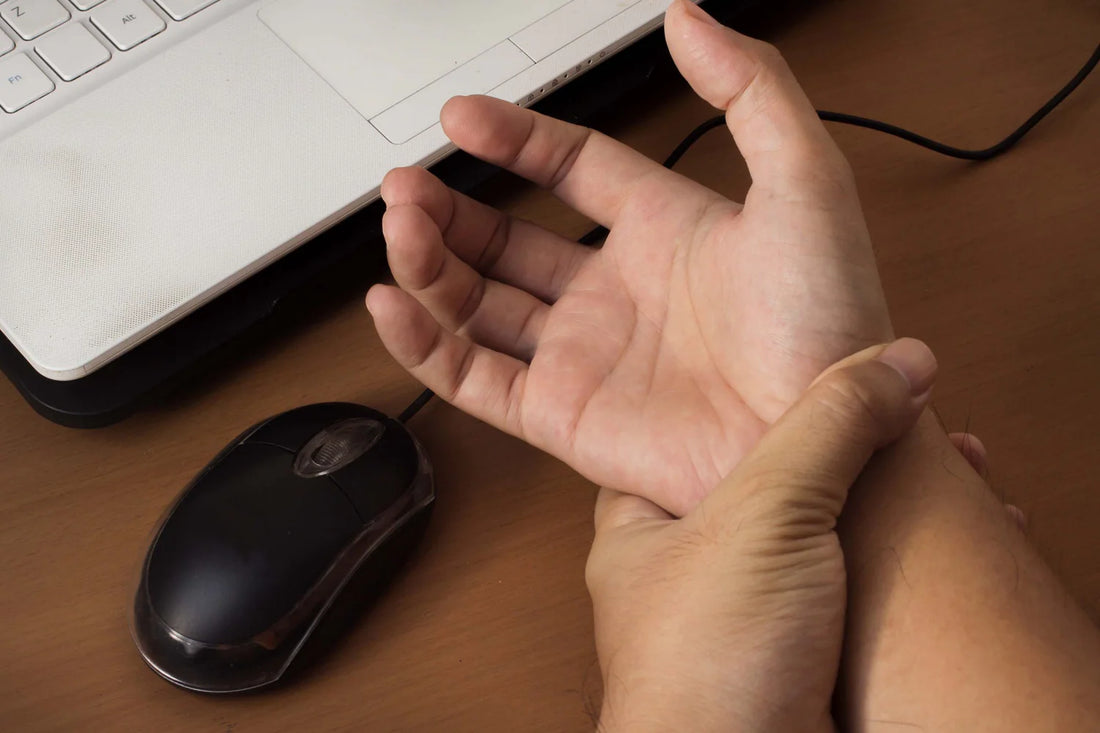The Causes, Concerns and Care for Carpal Tunnel

Share
It has long been debated whether a person’s life is dependent on their brain or on their heart. All agree, though, that when either the heart or the brain fails, the other won’t work for long.
Carpal Tunnel Syndrome is a problem with the median nerve in the wrist that causes the hand to lose sensation for a short while (the hand will feel like it is “sleeping” or tingling). This occurs when the nerve in the hand becomes pinched between muscles. The syndrome can develop when there isn’t enough room for the nerves because of a structural abnormality, stress from repetitive hand motions, or as a result of another health condition. If this syndrome is treated properly, it can be completely healed and all sensation and abilities can be restored.
Tell Me More:
Carpal tunnel syndrome develops when there is pressure on the median nerve that runs through the carpal tunnel. The carpal tunnel runs along the inner side of the wrist. The median nerve controls the hand and the first three digits (thumb, index, and middle finger). The cause for the pressure on the median nerve is not always known, but it can happen from any kind of injury or swelling in the region. There are, however, certain risks that make one prone to carpal tunnel syndrome. Risks include: a structurally smaller-than-average carpal tunnel, working with the hands repetitively, especially with tools that vibrate, diabetes, kidney problems, and other health conditions. Excess fluid in the body can cause or worsen carpal tunnel syndrome. Women have a higher incidence of this syndrome than men.
When one is examined by a doctor, s/he will first be asked to describe exactly what they are feeling and the duration of symptoms. Afterward, the doctor will test the physical ability of the hand. At times, an x-ray or an electromyogram test will be necessary to see to the extent of the damage. With these tests, the doctor may be able to identify the root of the problem. Correcting the origin of the problem will relieve the patient’s symptoms.
Symptoms:
The symptoms of carpal tunnel syndrome usually occur over time and start with temporary loss of sensation in the thumb and index finger, followed by the middle finger. Patients have described feeling an electric feeling or tingling in their fingers. Carpal tunnel affects only the first three digits. (Feeling the same symptoms in your ring finger and pinky finger may be a sign of cubital tunnel syndrome; the cubital tunnel starts at the elbow.) The sensation can occur when holding a phone or book, driving a car and, very commonly, upon awakening. Loss of strength of the hand is also common.
See a doctor when the symptoms disrupt daily functioning and prevent you from carrying out routine tasks. Carpal tunnel syndrome can cause long-term damage if not treated in time.
Helpful And Healthful:
People suffering from carpal tunnel syndrome should take a B complex supplement. B6 is especially important as it can help treat this problem. It is also advisable to supplement with Inflame-X and Omega3 Platinum, both of which are anti-inflammatory.
Anything Else:
Carpal tunnel syndrome is not something that can be entirely avoided, but there are certain precautions to take. Firstly, use a light grip. Hands do not need to work too hard for most activities. If one needs to write or engage in fine motor skills activities on a constant basis, try using larger tools; this will reduce pressure on your hands.
Rest your hands every so often by wiggling your fingers and stretching them in all directions. Change activities to distribute stress.
Be careful not to bend your hands sharply upward or downward. If you are working at a computer, keep your elbows elevated, above your hands. It is of general important to have proper posture while working at a computer not to damage your muscles or your posture (think ergonomic). Try to keep your hands warm as the pain worsens in cold weather.
It is important not to place pressure on your hands while sleeping. There are splints that restrict hand movement while sleeping, so they remain in a healthy position during the night.
If the above does not help, a doctor may try other treatment options. If symptoms are mild and don’t persist, a splint may be enough. For a more serious carpal tunnel syndrome, operating may be necessary. The aim of surgery is to make more room for the affected nerves. This will be done by removing some of the muscle surrounding the nerves. A number of patients are completely healed through this surgery, but others may have symptom even after surgery.
Fascinating Facts:
• The color of the fingernails can indicate the oxygen level in the blood. Red indicates healthy oxygen levels. A blue tinge may be a cause for concern.
• The nails and hair are built from identical material. Both are made from the protein
Keratin.
• 10% of all men and 6% women are left handed.
• It takes approximately six months for nails to grow from beginning to end.
• Fingers don’t have muscles. They are controlled by muscles in the hand. The muscles are attached to the fingers by large tendons.
How we reviewed this article:
Our experts continually monitor the health and wellness space, and we update our articles when new information becomes available.
 Advanced Health
Advanced Health Bone & Joint
Bone & Joint Children's Health
Children's Health General Health
General Health Healthy Heart
Healthy Heart Immune System
Immune System Men's Health
Men's Health Mind & Spirit
Mind & Spirit Pick Me Up
Pick Me Up Targeted Multis
Targeted Multis Women's Health
Women's Health Superfoods
Superfoods